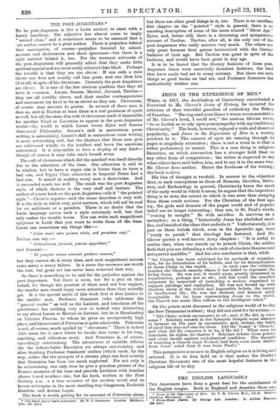THE POST-AUGUSTANS.*
To be post-Augustan is (for a Latin author) to start with a heavy handicap. The adjective has almost come to imply " second class," and it sometimes seems to be assumed that a 'ate author cannot be a great author. There is prejudice behind that assumption, of course—prejudice fostered by school- masters and dictionaries and sheer ignorance—but there is a light instinct behind it, too. For the warmest advocate of the post-Augustans will generally admit that they make little spiritual appeal and are more easily admired than liked. Perhaps the trouble is that they are too clever. If one calls a man clever one does not usually call him great, and one likes him (if at all) in spite of his cleverness. Certainly the post-Augustans are clever. It is one of the few obvious qualities that they all have in common. Lucan, Seneca, Martial, Juvenal, Tacitus- they are all terribly clever, and their smaller contemporaries and successors try hard to be as clever as they are. Cleverness, of course. may amount to genius. In several of these men it does so, and in Tacitus at least there is a real greatness of spirit as well, but all the same this cult of cleverness made it impossible for another Virgil or Lucretius to appear in the post-Augustan world—the world in which Lucan wrote Epics and Seneca discoursed Philosophy. Seneca's skill in sententious prose writing is astonishing, Lucan's skill in sententious verse writing is more astonishing still, but the displays that these men give are addressed wholly to the intellect and leave the emotions untouched. It is impossible to love a display of any kind— though of course it may take one's breath away.
The cult of cleverness which did the mischief was itself directly due to the education of the time. Our education is said to be aimless, but to have a vague aim is better than to have a bad aim, and Upper Class education in Imperial Rome had a bad aim. It aimed at making every man a rhetorician. And it succeeded much too well. The result was the post-Augustan style, of which rhetoric is the very stuff and texture. The author of a new book on the post-Augustans calls it " the pointed style "—Cicero's argutus—and the name describes it very well. It is the style in which only point matters, which will sell its soul for an antithesis or a paradox. There is no doubt that the Latin language serves such a style extremely well, but that only makes the trouble worse. You can write such magnificent epigrams in Latin that you want to write them all the time. Lucan can sometimes say things like :- " Scire mori son prima viris, sed proxima corgi."
Tacitus can say :—
" Solitudinem faciunt, pacem appellant,"
and Juvenal :—
" Et propter vitaes vivendi perdere causes,"
but they cannot do it every time, and each magnificent success costs many a weary failure. In a sense the successes are worth the cost, but great art has never been achieved that way.
So there is something to be said for the prejudice against the post-Augustans. Yet there is room, too for a plea on their behalf, for though the greatest of them need not fear neglect, the smaller men would repay more attention than they actually get. It is the special merit of this book that it does justice to the smaller men. Professor Summers (who addresses the " general reader " as well as the Latinist, and translates all his quotations) has nothing very new or indeed very interesting to say about Lucan or Martial or Juvenal, but he is illuminating on Valerius Flaccus. to whom he gives an unexpectedly high place, and his account of Petronius is quite admirable. Petronius is not, of course, much spoiled by " cleverness." There is indeed little room for it (save where he breaks into verse) in his long, rambling, and ridiculous story. And Petronius is, of course, exceedingly entertaining. The adventures of amiable villains like the indescribable Encolpius are always entertaining, and after finishing Professor Summers' outline (which reads, by the way, rather like the synopsis of a cinema play) one feels acutely that Petronius has been too much neglected. For not only is he entertaining, not only does he give a priceless picture of the Roman manners of his time and provide Latinists with familiar idioms found nowhere else, but his book, written in the First Century A.D.. a true ancestor of the modern novel, and its heroes anticipate in the most startling way Gargantua, Roderick Random, and Arsene Lupin.
The book is worth getting for its account of Petronius alone,
• The Siker Age of Latin Literature. By W.C.Summers London Methuen. 110s. ad. mt.]
but there are other good things in it, too. There is an excellent first chapter on the " pointed " style in general, there is an amusing description of some of the more absurd " Silver Age ,, Epics, and, better still, there is a discerning and sympathetic account of Tacitus. Tacitus, after all, is the only one of the post-Augustans who really matters very much. The others ara only great because their genius harmonized with the literary fashions of their age. But Tacitus was great in spite of the fashions, and would have been great in any age.
It is to be feared that the literary fashions of these post. Augustan times were essentially decadent fashions, the kind that have made bad art in every century. But there are such things as good books on bad art, and Professor Summers has undoubtedly written one.


































 Previous page
Previous page